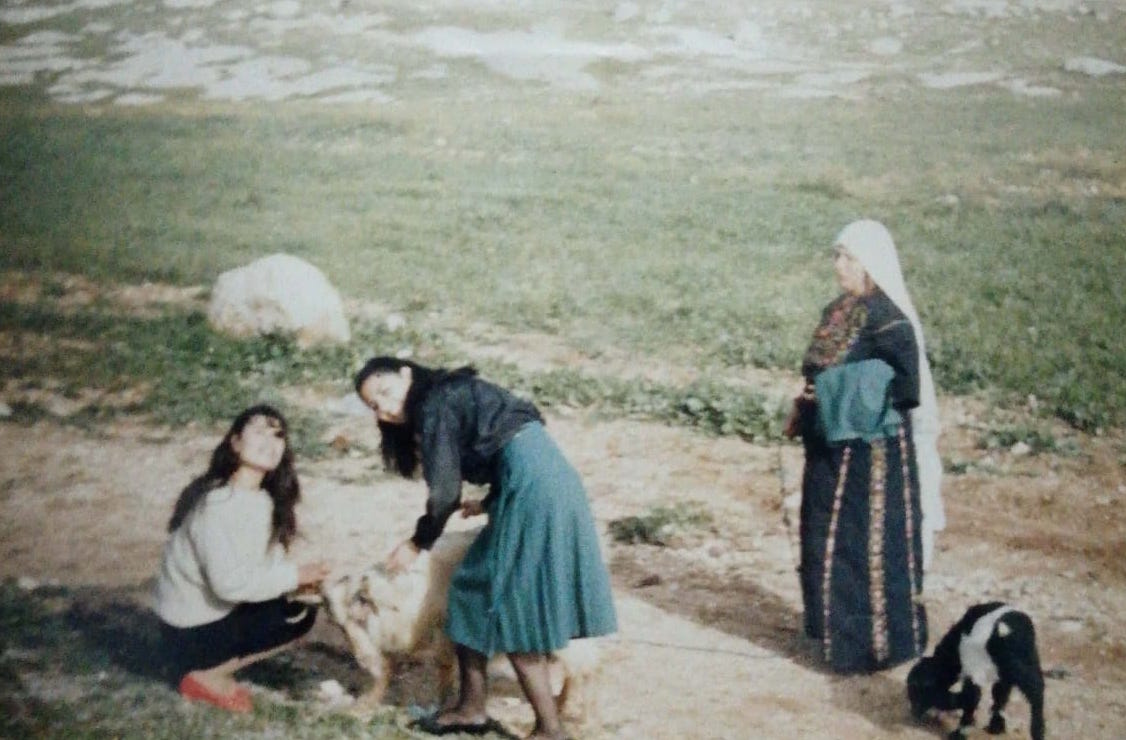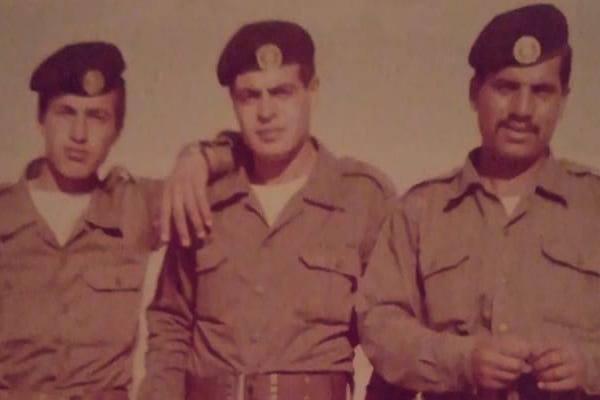For Madlaine Ahmad, born and raised in Doha to Palestinian parents with Jordanian citizenship, the answer to ‘where are you from?’ is never simple, and always seems to be wrong.
By Madlaine Ahmad

I changed my Facebook profile picture the other day. It was a photo of a fair woman covered in gold and henna. It would have been clear to anyone from bilad al-sham (the Levant) that she was from the Gulf region, where women dress up a certain way. “How beautiful,” one person remarked. The comment that followed, by a Palestinian friend, surprised me: “Women are beautiful, but the hands of our women in particular are the most beautiful.” I didn’t understand what she meant, and a discussion ensued: “If you lined up everybody’s hands side by side, I would still be able to distinguish those of the Palestinian falaha (peasant), and I would feel an immense love for her.”
We Palestinians stand out in many ways: with our scorched arms after the harvest, our diaspora, the occupation, our widows and orphans, and death – so much death. Usually, the word “Palestinian” elicits images of a child hurling stones at a military tank, and the perception is that only Palestinians who live within the borders of Sykes-Picot still suffer, that those who freed themselves from these invented borders managed to survive and thrive. Well, let me tell you about my experience, as a Palestinian whose ancestors escaped.
My Palestine story is brief. It does not contain death, or soldiers, or hurling rocks. I have never had to face the occupier, but I also haven’t been fortunate enough to visit any part of Palestine. During the 1948 war, my grandfather fled with his family to Karak in Jordan. They were told they would be able to return in a matter of weeks. They set up tents and planted wheat and waited for Palestine, but Palestine never came. In a heartbeat, the Palestinian dream was lost, and they became victims of history, uprooted, with nothing but a key to a home they would never return to.
They moved to Amman, where they tried to forge a new life with their nine children. They could only afford a two-bedroom house – one room for the chickens they were raising, and another to sleep the family of 11. My father told me how, at 13, he helped build the railway that still functions to this day. He told me how he would study under the street lights at night, because they did not have electricity at home. It was painful for him when he had to move to Lebanon to complete his studies. Upon graduating, he returned to Jordan, where he served in the military for two years.
Soon after, the dream of a job opportunity in the Gulf presented itself, and he moved with my mother to Qatar. There, I was born. I was raised in Doha as a Jordanian – my official papers had no mention of my Palestinian heritage. My father would say we were from Palestine, but who ever paid attention to my father’s words? Whenever I was asked, “where are you from, Madlaine?” I would say, “from Jordan.”

In 2010, a dispute developed between the two countries; Qatar would revoke all work permits for Jordanians, and expel them back. I arrived in Jordan two years short of 20, thinking I had finally come home! It had not occurred to me that the dispute which ended my father’s work prospects would also destroy my childhood memories. I had never lived in Jordan, and was new to everything in my homeland, which, I soon learned, it was not.
Now, when asked “where are you from, Madlaine?” I simply say, “from here.” I am then confronted with a more precise question: “Which province in Jordan are you from?” To which I feel compelled to say, “I am Palestinian, originally from the city of Hebron.”
I soon learned that, whatever my answer, it would be the wrong thing to say in any situation. If you say you’re Palestinian, you are usually reprimanded for denying a favor: “You [Palestinians] came here, were raised here, given the chance to study and work – is that not enough to warrant your assimilation?” But if I were to say that I’m Jordanian, I wouldn’t hear the end of it from fellow Palestinians who would accuse me of denying my identity and “selling the cause” for some privileges.
In my journey of discovery, I learned of two sports clubs in Jordan. Al-Wehdat was established in 1956, at the Wehdat Palestinian refugee camp, and remained a subsidiary of the United Nations Relief and Works Agency. It won’t be an exaggeration to say that every Palestinian in the Hashemite Kingdom of Jordan roots for Al-Wehdat. Perhaps they see themselves in the team, see proof that refugees, too, can succeed, and therefore find it easier to accept the stamp of diaspora. And then there’s the Faisaly Sports Club, which enjoys support and admiration from all Jordanians.
Any match between these two teams is a war: a cold war precedes the games, and then it turns into a full-blown battle on social media, where Palestinians are nothing short of bullied, with statements like, “pack your mulukhiyyahs and make your way home through the bridge.” They mean the King Hussein Bridge, which most of our ancestors walked when they sought refuge. There have been plenty of violent incidents in the stands at these games, leaving many wounded, and some even dead.
I got engaged to my ex-husband – who was Jordanian-Jordanian, not Palestinian- Jordanian, as I am – after a love affair that lasted for months. His family, however, did not approve of a Palestinian woman. But I am Jordanian, I would think to myself. I don’t know what the trick was, but eventually, they accepted me. Still, I would have to sit in their living room and endure the hurtful statements of news commentators, who would say things like “Palestinians are to be blame for selling their lands,” or “they [Palestinians] are all agents.” Perhaps his family thought that, now that they’ve accepted me as a Jordanian, I did not have the right to oppose those statements or defend Palestinians.
Once, when my husband and I were living in Saudi Arabia, my mother-in-law and her brother came for a visit on their way to Hajj (pilgrimage). As we walked down one of the streets, some souvenirs in the colors of the Jordanian flag caught their eyes. “Why don’t you get one for yourself,” suggested my mother-in-law, “since the colors of our flag are the same as those of the Palestinian one.” Her brother took offence: “Palestine? What is your nationality, Madlaine?” I said I carry a Jordanian passport. “Then you will buy these on the grounds that you are Jordanian.”
I had given up on talking back, or making any statements at all, really. Until I gave birth to my son. As any mother, I felt the need to pass on my culture and history to my child. My husband and his family were not pleased with that. They made it clear to me that my son was Jordanian, with no stake in the Palestinian struggle. He is even to be prevented from listening to Al-Wehdat’s anthem. For this and several other reasons, I divorced my husband.
We fled from the occupier to find ourselves in countries that consider us, Palestinians, occupiers. They see us as people who have robbed them of their livelihood and stole their lands. As if our ancestors did not harvest this land with them, as if we had not built their railways with them, or studied in the flickers of street lights to complete our education, or served in their armies.
My childhood was wiped out because the country that saw me as Jordanian expelled me, but I came here only to discover that I am not Jordanian. That for my son to be considered Jordanian, he must not have any association with his mother’s Palestinian roots. Not everyone who fled Palestine has managed to survive, and the occupation is not the only source of our oppression. I can no longer tell where I am from, for my homeland denies my identity, and I have no evidence of my heritage.
Madlaine Ahmad is Jordanian of Palestinian descent. She lives in Jordan, where she works as a translator for local online platforms, and edits for aljazeera.net. She is interested in covering marginalized voices in society in a way that humanizes their experiences.
